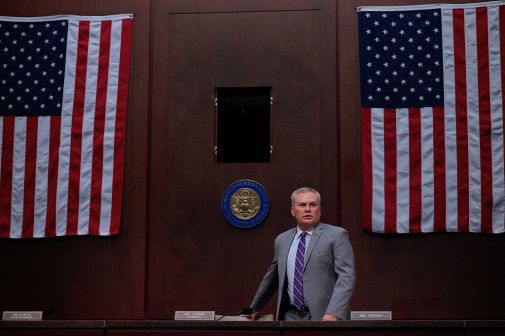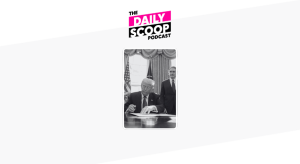Growing data culture requires agencywide buy in, officials say

When federal officials gathered at the Chief Data Officers Council symposium Thursday, it didn’t draw protesters outside the building with signs calling for more data and evidence in government.
And in some ways, that makes those issues less pressing for leadership, Jacob Malcom, the Department of Interior’s statistical official, said on a panel discussion about evidence-based decision-making. “There isn’t a big constituency,” he explained.
Unlike other challenges, such as conservation issues, data and statistics don’t have large bases that can be activated to speak up. Yet people do care about the effectiveness of government services and programs, he said.
“There isn’t that external pressure that will help leaders say, ‘ah, I need to respond to this,’” Malcom said.
That anecdote drove home a point that permeated remarks made by chief data officers, evidence and statistical officials at the symposium: Building a data culture within the federal government needs buy-in from across each organization, including from leadership.
A recent Data Foundation survey found a similar sentiment among CDOs. While making progress on issues such as advancing data strategies, CDO respondents reported declining clarity in their roles and lack of support from leadership. In fact, one-third of the respondents said that leadership resistance was a top barrier to building a data-driven organization and to the success of the CDO community, per the survey.
Carin Quiroga, the chief data officer of Immigration and Customs Enforcement, said on a panel that there isn’t one mission in her agency that doesn’t rely or depend on data. She emphasized that in order to build a good data culture and be more efficient, people need to come together with the same language and standards and not silo themselves.
“We need everybody in this room to do that. We need executives. We need you to prioritize that. We need you to talk about it,” Quiroga said on a panel about data-drive culture. “We need you to show up and encourage your teams and your groups to say, ‘Hey, are we prioritizing data? Do we care about data quality?’”
Ultimately, data culture is an integral part of the role of data leaders, Oliver Wise, the Department of Commerce’s CDO, said on that same panel. Data culture “isn’t a byproduct or something that you also think about in addition to thinking about” other responsibilities such as data inventories, he said.
“The data culture is the thing,” Wise said. “And all the other problems — the types of things you work on as a data leader — are important artifacts and tools that can help you get there. But … the data culture is the end to itself, and that is the really hard challenge of data leadership.”
Generating excitement
Some agencies are getting creative in building that excitement.
At ICE, for example, Quiroga said part of that is getting data and information into peoples’ hands. To do that, she led efforts to create something called the “Data Bodega,” which is a centralized location for people to go to access and learn more about that information.
“By making the data known, accessible and making sure it’s reliable data, they have one place to go to make it easier for them to use data,” Quiroga said.
She also said she leads “lunch and learns” and “micro-learning sessions” to get people comfortable with that information. “I think that’s what holds a lot of people back. It’s just that comfortable and confident feeling.”
Other agencies are getting people in a competitive spirit.
Naomi Adaniya, CDO of the Drug Enforcement Administration, said her agency has done multiple rounds of a “Shark Tank”-style competition for data ideas. “Every single person at DEA honestly has great ideas of how can we do better with data,” Adaniya said on the panel with Wise and Quiroga.
That competition is judged by external judges, including the department’s chief information officer and the CDO from the FBI, she said. Then the ideas are selected and implemented.
“Sometimes an idea might actually already fit into an existing project that we’re doing,” Adaniya said. It’s about getting an employee, like an intel analyst in Memphis, to see how her idea helped and made an impact that will last for the rest of DEA’s future, she said.
Similarly, the Department of Health and Human Services has a contest. Susan Jenkins, director of the Division of Evidence, Evaluation and Data Policy, said on the evidence panel that the department’s CDO had an annual data contest last year that included an evidence category.
That contest helped value the data collectors and evidence builders and provided an opportunity for people to see if there was something they wanted to be involved in. “We also learn more about people that are building evidence that we don’t know about,” she said.
The symposium comes roughly five years after the Foundations for Evidence Based Policymaking Act established the requirement for CDO roles, authorized the CDO Council, and launched actions to work toward data-backed decision-making in government. It also comes as the CDO Council nears its sunset in 2025, which there are bipartisan efforts in Congress to avert.
Survey says
Beyond leadership challenges, the recent Data Foundation survey also found that CDOs wanted more clarity about their role and responsibilities.
While chief data officers reported wins — including high rates of success when it came to achieving their missions and increased data maturity in their respective organizations — clarity about their responsibilities actually declined in 2024.
Roughly half of CDOs surveyed cited conflicting statutory or legal authorities as an issue, which is an increase of almost 15% from the previous year, according to the report. And over half said they need more guidance on their responsibilities when it comes to artificial intelligence.
That decline is likely influenced by the absence of guidance for implementing the OPEN Government Data Act, emergence of AI, and overlap with chief information officers and chief AI officers, Katie O’Toole, a Data Foundation senior policy and research analyst, said on a webinar about the survey results.
As a result, the Data Foundation is recommending that the White House take actions to provide that clarity to officials, calling for the Office of Management and Budget to issue OPEN Government Data Act implementation guidance, and clarify roles and responsibilities of CDOs as they relate to other information officials, including CIOs and chief AI officers.
Sources told FedScoop in October that the OPEN Government Data Act guidance, or “Phase II” guidance, is in its final stages and the White House was aiming to get it out by the end of November. However, it’s not clear if the results of the presidential election have impacted that timeline.






